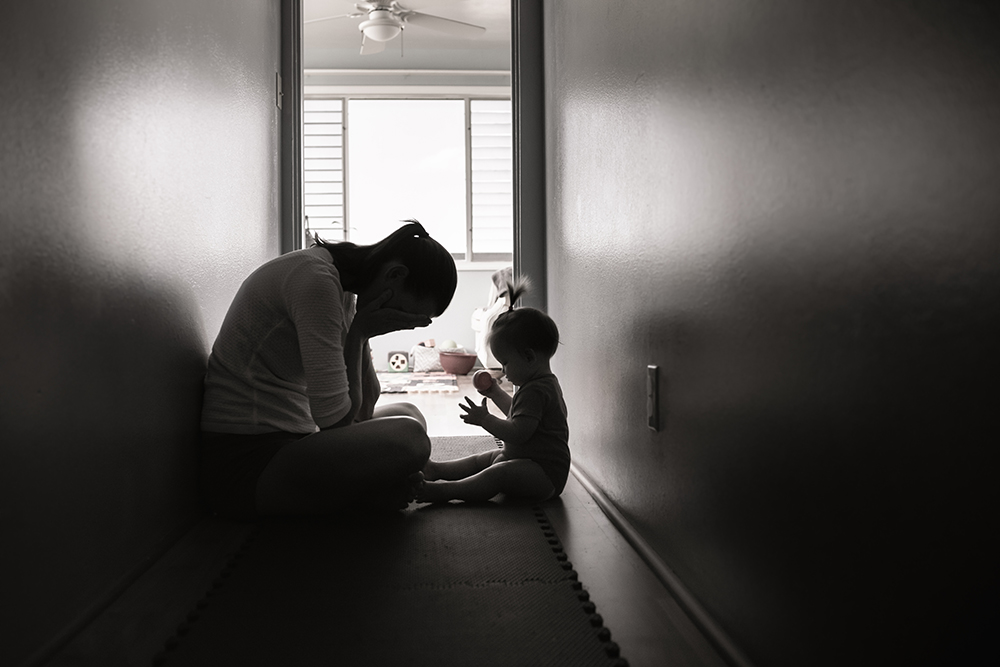
PROSPECT HEIGHTS — Allison Auth always thought that when she gave birth to her first child, it would be a glorious experience. “I thought the baby came and you just figured it out and fell in love with the baby,” she said.
But it didn’t turn out that way.
Her first child, a son she and her husband Nathan named Timothy, was delivered via an emergency C-section. “So I felt the trauma of that birth experience,” Auth recalled. “It wasn’t what I was expecting. Nobody had really prepared me for that possibility. You’re just coming to grips with having your body cut open and then trying to recover while taking care of a child.”
Auth, a Catholic writer who lives in Denver, soon found herself in the grip of postpartum depression. Her feelings of exhaustion and hopelessness escalated when she found out she was pregnant again. At the time, Timothy was only 7 months old.
Her second child, a girl named Lily, was a colicky baby. Auth also had trouble nursing. “That’s when I felt the darkest. I think it was because I was in a lot of pain. And my baby was really fussy. I also had an 18-month-old to take care of. I remember just feeling alone. It was overwhelming. I cried a lot and felt a lot of anger,” she recalled.
Timothy and Lily are now healthy 12 and 10 year olds and Auth wrote a book about her experiences called, “Baby and Beyond: Overcoming Those Post-Childbirth Woes,” published by Sophia Institute Press, a Catholic publisher.
According to the March of Dimes, postpartum depression (PPD) affects 1 in 7 women. It can occur at any point after giving birth but most commonly starts 1 to 3 weeks after the baby is born.
Unlike so-called “baby blues,” the sad feelings mothers experience for a few days or a couple of weeks after childbirth, PPD can continue for months, even a year or more.
The symptoms include difficulty bonding emotionally, exhaustion, feeling overwhelmed, lack of sleep or sleeping too much, and having trouble concentrating or performing ordinary tasks like showering and personal grooming. In extreme cases, a mother can have thoughts of harming oneself or the baby.
There is help for women experiencing PPD. One place women can turn to is the Postpartum Resource Center of New York Inc., a nonprofit program based in Islip, Long Island, that was founded in 1998 and has a comprehensive database of doctors, therapists, social workers, and other professionals.
Women can also call 311, New York City’s non-emergency helpline. The 311 operator can connect callers to resources in their neighborhoods. And there is 988, the suicide and crisis hotline.
Rosemary Napolitano, founder and president of the Breath of Life Pregnancy Center, a faith-based program in Islandia, Long Island, founded in 2004, said she recommends the Postpartum Resource Center of New York to her clients.
Talking about PPD openly without fear of judgment is an important first step for sufferers, Napolitano added. “In the past, women didn’t bring it up and doctors didn’t bring it up. Women were afraid. They thought, ‘If I admit what I’m going through, they’re going to take my baby away from me.’ One of the first things I tell women is that postpartum depression doesn’t make you a bad mother,” she explained.
Auth, who has a theology degree from Franciscan University of Steubenville, would like to see Church members talk more openly about PPD.
“I think well-meaning people are trying to fight against this culture of death and we’re trying to have this culture of life. People are saying children are good and families are good. And that’s all true. But it’s also really hard. And let’s start talking about the hard part so people don’t feel alone,” she said.
PPD doesn’t just strike new mothers. According to the Cleveland Clinic, women who have experienced it before have a 30% higher risk of it with subsequent pregnancies. Or as Napolitano put it, “If you had it before, you’ll have it again.”
To make PPD sufferers more comfortable, Napolitano’s pregnancy center will often hold meetings and informational sessions in a library. “That way, she doesn’t feel like she’s walking into a doctor’s office,” she explained.
Napolitano’s faith-based approach also includes prayer sessions. “The most important thing to convey to a mother is that God loves her and that whatever she is going through, God is with her,” she added.
Faith was an important component of Auth’s healing process. “There was a beautiful moment at Lily’s baptism. I felt like the Lord was saying to me, ‘There’s a reason that she’s here.’ And, suddenly, I felt like we were going to be OK. God knows what he’s doing,” she recalled.
Auth also employed practical measures to climb out of the dark hole of PPD. “I started putting some things in place, like a little bit of walking for exercise. And I realized that I needed some time for my mental health. I started verbalizing my needs with my husband so I could get some space away from the kids to work on myself,” she recalled.
It all worked out well. Auth and her husband are now the proud parents of five children: Her children are Timothy, 12; Lily, 10; Luke, 9; Zoe, 6; and Paul, 2.
Resources for Postpartum Depression
- Postpartum Resource Center of New York: postpartumny.org
- The Office on Women’s Health at the U.S. Department of Health and Human Services: womenshealth.gov
- Postpartum Support International: postpartum.net
- Breath of Life Pregnancy Center: breathoflifecenter.org
- The New York City Department of Health: nyc.gov/site/doh/health/health-topics/post-partum-depression.page
